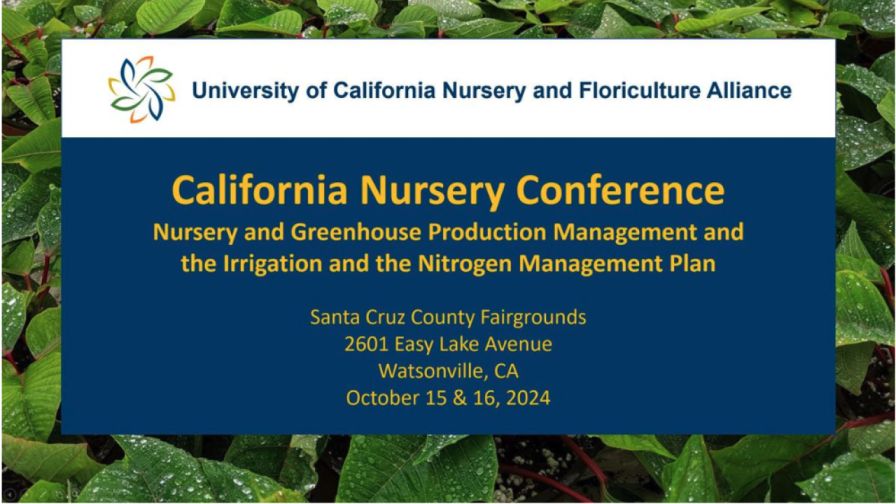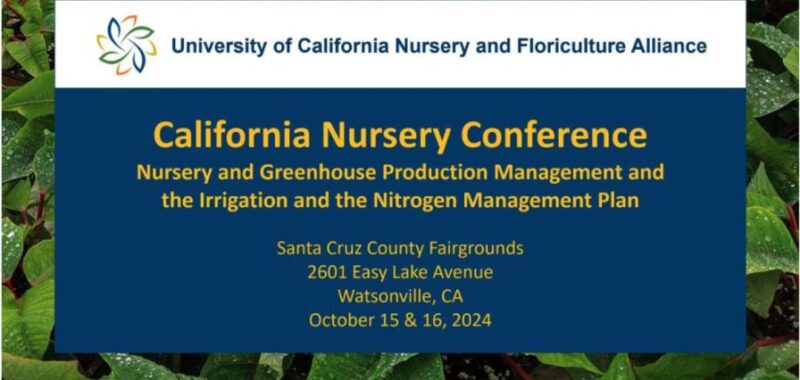
2024 California Nursery Conference event infographic | University of California Nursery and Floriculture Alliance (UCNFA)
In mid-October, the University of California Nursery and Floriculture Alliance (UCNFA) hosted its California Nursery Conference in Watsonville, an opportunity to share research, discuss challenges impacting nurseries and greenhouses, and network with industry leaders. It was the first gathering of this kind since 2019.
Organized by UCNFA and the Western Region of the International Plant Propagators’ Society, and co-sponsored by the Plant California Alliance, the conference attracted nearly 100 attendees from across California.
As a statewide partnership of researchers and educators, growers, floriculture associations, and allied industries, UCNFA coordinates and implements outreach for UC Agriculture and Natural Resources‘ Floriculture and Nursery Workgroup. UCNFA’s main goal is to provide essential information to growers and educate them on how to use their knowledge effectively to maximize production, improve resource use efficiency, and ensure regulatory compliance.
“This support for growers is essential given the diversity of California agriculture and the rapid changes in methods, technology, and regulatory pressures,” says UCNFA Co-Director Loren Oki. Oki has been co-directing UCNFA alongside David Fujino, Executive Director of the California Center for Urban Horticulture, since 2009.
New Advisors Leverage Networking Opportunity to Identify Programmatic Goals
Serving areas ranging from San Diego to Sacramento, UC Cooperative Extension academics in attendance at the conference included Grant Johnson, UCCE Urban Agriculture Technology Advisor for Orange and Los Angeles counties; Chris Shogren, UCCE Environmental Horticulture Advisor for Orange and Los Angeles counties; Johanna del Castillo, UCCE Assistant Professor and Plant Pathologist at UC Davis; and Aparna Gazula, UCCE Small Farms Advisor for Santa Clara, San Benito, and Santa Cruz counties.
Haramrit Gill, who became UCCE Environmental Horticulture Advisor for Tulare, Kings, Fresno, and Madera counties this year, expressed gratitude for the guidance she’s received from seasoned colleagues like Bruno Pitton, UCCE Environmental Horticulture Advisor for Placer and Nevada counties; Gerardo “Gerry” Spinelli, UCCE Production Horticulture Advisor for San Diego County; and Don Merhaut, UCCE Specialist for nursery and floriculture crops based at UC Riverside.
“This kind of mentorship is really needed, because it’s helpful to see how others manage their research programs and move forward in their career,” says Gill.
Unlike Gill’s rural terrain, Jessie Godfrey is a UCCE Environmental Horticulture and Water Resources Management Advisor for Alameda, San Mateo, San Francisco, Contra Costa, and Santa Clara counties. Although her research program is still in its early development stages, Godfrey used the opportunity to present at the conference to discuss the connection between nurseries and urban tree planters.
“Particularly given that many of us are stepping into previously unfilled roles in our counties and there’s a lot of unfamiliarity with urban clientele, I think regional events like this are a critical opportunity to introduce clients to their UCCE network and peers,” says Godfrey.
Attendees Engage in Live Demos and Tour of Local Nurseries
The conference also offered live demonstrations to teach attendees how to manage plant nutrition, irrigation, diseases, and pests. At one table, Ana Pastrana, UCCE Plant Pathology Advisor for Imperial, San Diego, and Riverside counties, set up sanitation mats with disinfectant to demonstrate effective cleaning practices that prevent plant diseases.
On another table, Eric Middleton, UCCE Integrated Pest Management Advisor for San Diego, Orange, and Los Angeles counties, placed leaves under magnifiers to demonstrate how insect identification apps work.
Other demonstrations included measuring container capacity and water content in different substrates, electrical conductivity (EC) contribution of fertilizers, estimating nitrogen in liquid feed from EC measurements, and more.
“I learned a lot from the talks and demonstrations, and the opportunity to present my work led to valuable conversations with nursery growers. The insights I gained will inform my program planning and outreach to nurseries in my counties,” says Joanna Solins, UCCE Environmental Horticulture Advisor for Sacramento, Solano, and Yolo counties, who presented on California’s recent urban water conservation legislation and the need for more climate-ready landscape trees.
To conclude the conference, participants toured nurseries in Watsonville, including Driscoll’s, Griggs, Los Arroyos, and Four Winds Growers. Each nursery welcomed the group and focused on highlighting unique aspects of its operation.
At Driscoll’s, participants learned about plant tissue culture and clean stock procedures as part of a larger effort to produce virus-free plants. Four Wind Growers showcased its greenhouse, where the mother plants of its citrus trees remain planted in the ground. The company shared its need for USDA-certified pest exclusion facilities to protect plants from Asian citrus psyllid, which vectors huanglongbing (citrus greening) disease.
Considering participant feedback, UCNFA’s administrative committee is looking forward to planning next year’s conference and leveraging the new generation of advisors. “It’s wonderful that we have so many new people who are young and energetic,” says Merhaut. “We need them. They’re going to carry the torch when us old people can’t anymore,” he says, jokingly.
Learn more about UC NFA here: https://ucnfa.ucdavis.edu/.

